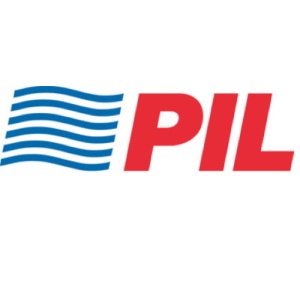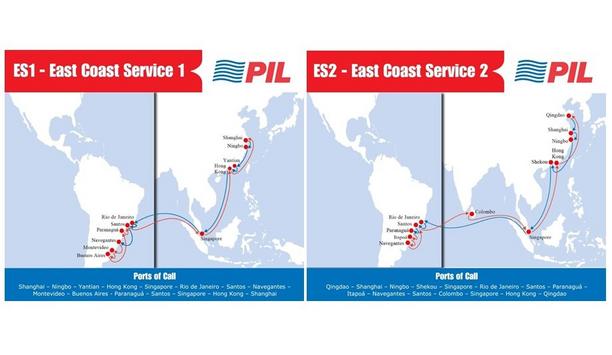Pacific International Lines (PTE) Ltd - Experts & Thought Leaders
Latest Pacific International Lines (PTE) Ltd news & announcements
Pacific International Lines (PIL) is pleased to announce that they have launched the China Calcutta Service (CCS), the first in the market to link South China to Calcutta directly. The weekly service started on July 2, 2024, from Xiamen. PIL’s continued commitment Mr. Surendran Mathilagath, General Manager of Intra-Asia Services at PIL, said, "PIL is pleased to be a pioneer in offering a direct China to Calcutta service, supporting the high growth and trade in these two economies. This service also connects customers with a gate-way to Singapore for the Southeast Asia market, as well as Bangladesh, the East Coast of India and Myanmar." "The launch of this service demonstrates PIL’s continued commitment to be a first mover to meet the needs of the market by providing customised solutions for our customers." The rotation for the CCS service includes the following ports: Xiamen-Shekou-Singapore-Calcutta-Singapore-Xiamen.
To improve and enhance its presence in East Coast South America, Pacific International Lines (PIL) is pleased to introduce two revamped weekly direct services, connecting key ports in China, and Singapore, with Brazil, Argentina, and Uruguay. Known as East Coast Service 1 (ES1) and East Coast Service 2 (ES2), they are an enhancement of PIL’s existing Sino-South America Service (SSA) and South America Service 2 (SA2). ES1 and ES2 ES1 will commence on 10 May 2024 from Shanghai and will be served by a consortium of thirteen vessels, jointly deployed by PIL, Evergreen Marine Corp (EMC), Cosco Shipping Lines (COSCO), and CMA CGM (CMA). PIL will deploy four vessels on this service. ES2 will commence on 7 May 2024 from Qingdao and will be served by the same consortium with twelve vessels deployed. PIL has also recently set up its own agency office in Brazil, Pacific International Lines Agencia Maritima (Brazil), and appointed an experienced team, as part of overall efforts to deepen its ties with customers in Brazil and the larger Latin American region. East Coast South America expansion Mr. William Ho, General Manager, Long Haul Trade, Line Management Division, PIL said, “With the continuing promising growth prospects of the Latin America market, we have seen strong trade flows between Asia and Latin America." "Following our enhanced presence in West Coast South America, we would like to strengthen our presence in East Coast South America as well to drive connectivity and better serve the needs of our customers.” Ports of call The ports of call for the ES1 service are: ES1: Shanghai – Ningbo – Yantian – Hong Kong – Singapore – Rio de Janeiro – Santos – Navegantes – Montevideo – Buenos Aires - Paranagua – Santos – Singapore – Hong Kong – Shanghai The ports of call for the ES2 service are: ES2: Qingdao –Shanghai – Ningbo – Shekou – Singapore – Rio de Janeiro – Santos – Paranagua – Itapoa – Navegantes – Santos – Colombo – Singapore – Hong Kong – Qingdao
Pacific International Lines (PIL) has joined the non-profit organisation, Digital Container Shipping Association (DCSA), to drive standardisation and digital innovation in the container shipping industry. Digitalisation standards DCSA’s founding members consist of 9 of the 10 largest container shipping companies worldwide and represent approximately 70% of global container trade. The association was founded to accelerate digitalisation by streamlining and harmonising data standards, thereby creating an interoperable framework with reduced friction, cost, and a better customer experience. PIL and DCSA will collaborate on the development, alignment, and validation of digitalisation standards to increase adoption across the industry. Cargo visibility and equipment management Having common and interoperable data standards and legislative conditions will enhance delivery schedules DCSA standards aim to address needs such as paperless trade, cargo visibility, port call optimisation, and equipment management. Having common and interoperable data standards and legislative conditions across international jurisdictions and platforms will significantly enhance delivery schedules. They will also improve the ease of communications and transactions across regulators, banks, insurers, carriers, customers, and stakeholders involved in an international trade transaction. Electronic bill of lading PIL has been embarking on a wide range of digitalisation initiatives, including the implementation of an electronic bill of lading (eBL) to decrease delivery times, increase the efficiency of operations and provide customers with a seamless experience. An eBL makes document creation, approval, distribution, and tracking easier while reducing potential fraud and eliminating the risk of paper documents being lost in transit. Standardisation and governance Mr. Lars Kastrup, CEO of PIL said, “PIL has been actively undertaking digitalisation initiatives and we are pleased to join DCSA to accelerate our journey while growing the industry’s digitalisation capabilities. Digitalisation not only increases efficiency and reduces costs, but it also cuts down on our carbon footprint and simplifies transactions for all stakeholders." "Complementing our participation in DCSA, PIL has also been working to incorporate standardisation and governance in our data and processes to enhance the way we work and optimise efficiency. For digitalisation to succeed, we need to work together for industry-wide adoption. These comprehensive digital capabilities will help equip international shipping to be more sustainable and future-ready.” Digitised supply chain Mr. Thomas Bagge, CEO Of DCSA said, "We are thrilled to welcome PIL to DCSA. As we continue our collaboration with industry partners to advance digitalisation of the container shipping industry, PIL’s participation represents another significant milestone." “Over the past five years, DCSA and its members have created a digital foundation that allows for industry to improve the customer experience, reduce cost, and help the industry shift towards a more sustainable future. We are looking forward to continuing our work with PIL and our other partners to help realise our vision of a fully digitised supply chain." Sustainability, interoperability, and efficiency DCSA endeavours to foster sustainability practices, promote interoperability and efficiency across the industry, enhance customer experiences, and unlock valuable insights from data. DCSA’s goal is to achieve this by producing standards that are beneficial to all parties involved in international trade and to achieve the widest possible adoption of those standards. Switching away from the transfer of physical paper bills of lading could save $6.5 billion in direct costs for stakeholders, enable $30-40 billion in annual global trade growth, and ensure the long-term sustainability of international trade.























